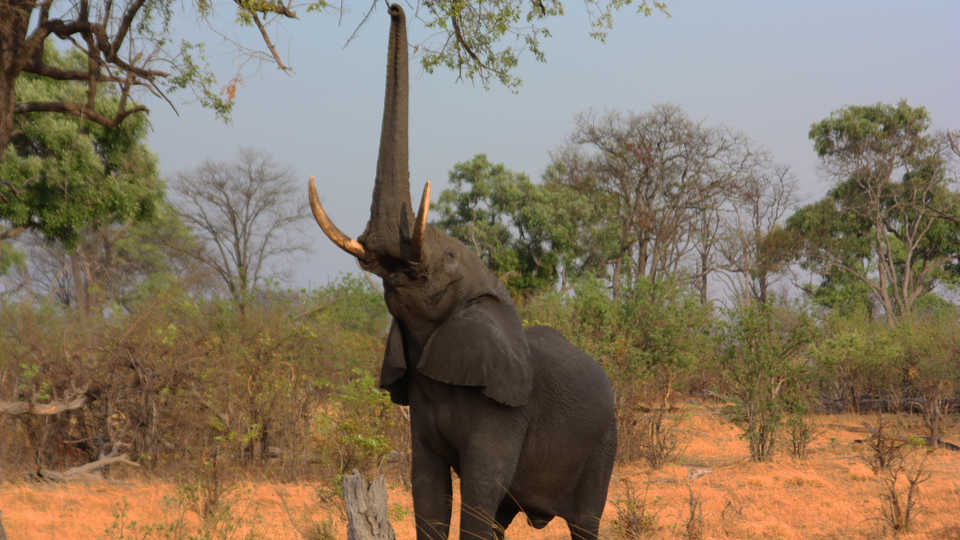Science News
Saving Elephants with Science and Support

In a passionate and frustrated press conference at the recent American Association for the Advancement of Science (AAAS) Annual Meeting, scientists and conservationists shared the latest numbers, news, and research on elephant poaching and the ivory trade with an air of helplessness.
Here are some of the numbers: There are only 450,000 elephants left in the wild and it’s estimated we are losing 50,000 of those per year to poaching. That means they could be entirely gone in a few years. Ivory is one of the largest parts of the $20 billion per year illegal wildlife trade and wildlife crime is the fourth largest transnational crime, behind drugs, weapons, and human trafficking.
The numbers are staggering, but likely not too surprising. These facts have been in the news for some time. So what can be done? Where do we stop the ivory trade? With the poachers, or the exporters, or the buyers? The source country or region? The buying country or region? The panel had several similar and conflicting ideas, and shared them all with a sense of urgency.
Allan Thornton of the Environmental Investigation Agency urged an outright ban on any ivory trade as was done in 1989. “It was effective right away,” he said. The problem with legal ivory trade is that it’s not as regulated and enforced as it should be. Illegal ivory is often bought and sold with legal permits. Surprisingly, in places such as Japan, ivory is sold legally online on foreign Amazon and Yahoo sites, he said. The 1989 ban was effective in protecting elephants for about ten years before regulated trade began again. Thornton puts the responsibility of the current elephant crime in the countries where ivory purchases are legal—China, Japan, the U.S., and more.
Scientist Samuel Wasser of the University of Washington, whose work tracking seized illegal ivory with DNA testing we covered last summer, can see where the ivory is coming from and believes the source is the place to stop these heinous crimes. “Focus on the biggest source countries,” he said. “Get the international community to do something about it” by not giving money to countries that fail to protect their elephants—“purse strings are the only push that will work.” He gave the example of Tanzania, a country that has lost 60 percent of its elephants since 2011 and recently received $100 million dollars in aid. “To make progress on illegal trafficking we need to tell these governments that they will get no money for anything from both governments and non-governmental organizations.”
William Clark, formerly of Interpol, said we need to target the importers to stop the ivory trade. In fact, Wasser’s work has determined that the ivory is seldom transported from the source country. His DNA testing also reveals that Mombasa is the biggest transit area for illegal ivory in Africa right now, with just a few major dealers in that location. “Our work already brought down one of largest ivory dealers in Africa, and we’re going after the largest now.” Clark is confident that Wasser’s genetic evidence can not only help find the source and the importers, but also serve as a powerful conviction tool in court and help to bring down entire ivory syndicates.
So is there any good news in the ivory trade? one reporter asked. Wasser is getting ivory seizures a lot quicker, which means he can track the crime much sooner. It used to take two to four years for him to get the ivory after it was seized, but now he gets them very quickly after the capture. Kenya—despite being the hub for ivory export—is make commendable efforts, Clark said.
And governments and states are getting closer to ivory bans, the entire panel said. In fact, that’s where you and I can make a big difference—urging our government officials to ban the ivory trade on a statewide or national level. Last fall, California joined New York and New Jersey in banning the trade, as did Washington State, who passed it not in the legislature, but on the ballot, bypassing some of the roadblocks facing other states and the U.S. Congress. (Surprisingly, the National Rifle Association is against the ban because ivory is often in gun handles. Wasser believes NRA members would support it, but not the leadership. Read more about state bans in National Geographic.)
With new science and support let’s relieve some of the frustration and helplessness and make sure that elephants survive far into the future.
Image: Charlesjsharp/Wikipedia